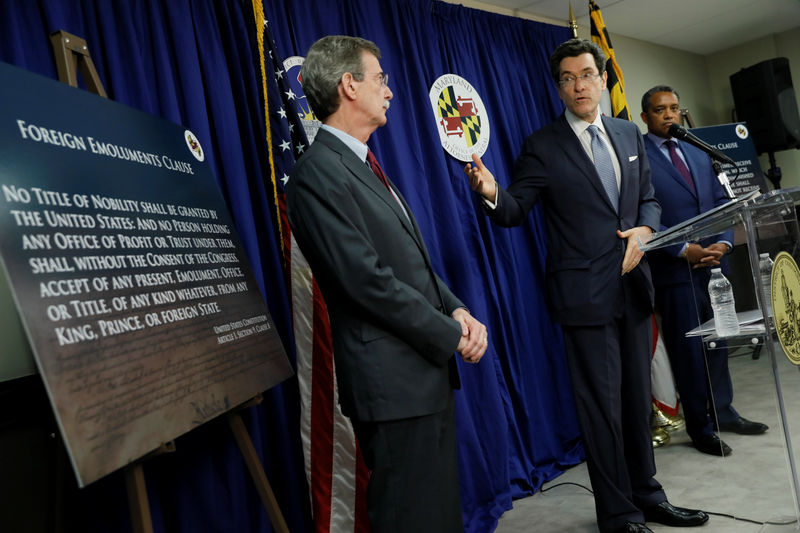By Dan Levine and Julia Harte
(Reuters) - The attorneys general of Maryland and the District of Columbia filed a lawsuit on Monday claiming that government payments to President Donald Trump's businesses violate the U.S. Constitution.
Payments to the president's enterprises from foreign and domestic governments through his hospitality empire draw business away from Maryland and D.C. venues and put local governments under pressure to give Trump-owned businesses special treatment, according to the complaint.
Foreign and domestic government payments to Trump's businesses were the target of a similar lawsuit brought in January by plaintiffs including an ethics nonprofit group, and Democratic lawmakers have blasted them as potential corrupting influences on Trump.
The Trump Organization has said it will donate profits from customers representing foreign governments to the U.S. Treasury but will not require the customers to identify themselves.
"Every time the president has spoken about drawing a line between his presidency and his businesses, he’s walked those promises back," said D.C. Attorney General Karl Racine said at a news conference on Monday.
The case by Racine and Maryland Attorney General Brian Frosh, both Democrats, has a better chance in court as the first government action over allegations that Trump, a Republican, violated the Constitution's so-called emoluments clauses, legal experts said.
Democratic attorneys general have taken a lead role in challenging Trump policies, successfully blocking executive orders restricting travel from some Muslim-majority countries.
The Maryland and D.C. attorneys general are seeking an order in U.S. District Court in Maryland preventing Trump from continuing to receive government payments beyond his salary.
White House press secretary Sean Spicer on Monday rejected the claim that Trump's business interests violated the Constitution and said "partisan politics" were behind the lawsuit. Trump's lawyers will likely move to dismiss the case, he said.
The Justice Department declined to comment.
Trump's ownership in hundreds of businesses hurts Maryland and D.C. and violates "emoluments" clauses in the Constitution that bar the president from accepting gifts from foreign governments without congressional approval as well as from domestic governments under any circumstances, according to the complaint.
While Trump turned over management of the umbrella Trump Organization in January to a trust controlled by his two elder sons, he still owns his businesses, including the Trump International Hotel in Washington, and can draw revenue from them at any time.
'NO MEANING WHATSOEVER'
The attorneys general argued they had standing to sue Trump because their citizens will be harmed if payments to Trump are used to influence his allocation of federal funds. They also said local hospitality companies, including state-owned facilities, are being harmed.
The Justice Department on Friday argued in the other lawsuit that the plaintiffs lacked legal standing to sue because they cannot allege enough specific harm caused by Trump's businesses.
The attorneys general have a better chance of establishing standing, legal scholars said, although they are divided over whether the AGs will ultimately succeed. Plaintiffs typically only have standing to file lawsuits under federal law if they can show they have been injured and a court ruling would remedy the harm.
Fordham Law School Professor Jed Shugerman said state governments' special duty to protect their citizens means they face a lower bar to standing in federal court, and the AG lawsuit should proceed.
However, Derek Muller, a professor at Pepperdine University School of Law, said it was unclear that this harm could be remedied by a favorable ruling.
The government has also said Trump hotel revenue does not fit the definition of an improper payment under the Constitution.
Payments to Trump's hotels do not qualify as a violation of the emoluments clause, which is intended to cover personal services performed by the president, the government said.
“If the Justice Department is correct, the emoluments clause has no meaning whatsoever,” said Frosh, the Maryland official.

“The president can stand over here with his president of the United States hat and he’s not allowed to take payments. But he takes a step over here and puts on his businessman hat, they can funnel as much money to him as they want.”